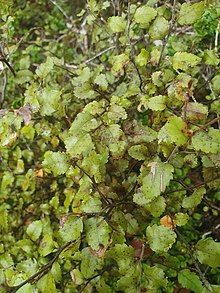Heliostibes vibratrix
| Heliostibes vibratrix | |
|---|---|

| |
| Illustration by George Hudson | |
| Scientific classification | |
| Kingdom: | |
| Phylum: | |
| Class: | |
| Order: | |
| Family: | |
| Genus: | |
| Species: | H. vibratrix
|
| Binomial name | |
| Heliostibes vibratrix | |
Heliostibes vibratrix is a species of moth in the family Oecophoridae.[1][2] It is endemic to New Zealand. This species inhabits open mountainside habitat and is known to feed on Nothofagus truncata. Yellow-crowned parakeets predate the larvae of H. vibratrix.
Taxonomy
[edit]This species was described by Edward Meyrick in 1927 using a specimen collected by George Hudson in January at Mount Arthur at 4000 ft.[3] The female holotype specimen is held at the Natural History Museum, London.[1]
Description
[edit]Meyrick described the species as follows:
♀ 16 mm. Head and palpi fuscous. Thorax rather darker bronzy-fuscous. Abdomen dark fuscous, ventral surface pale yellow. Forewings suboblong, termen hardly oblique; fuscous, with numerous irregular transverse cloudy dark purplish-fuscous striae; second discal stigma forming a small transverse dark fuscous spot; two slight whitish marks on dorsum about middle: cilia fuscous. Hindwings blackish-grey; cilia grey, basal third dark fuscous.[3]
Distribution
[edit]This species is endemic to New Zealand.[4]
Habitat and host species
[edit]
This species prefers open mountainside habitat.[5] The larvae of this species are known to feed on Nothofagus truncata.[6][7] Larvae are a predated by the Yellow-crowned parakeet.[8]
References
[edit]- ^ a b c Dugdale , J. S. (23 September 1988). "Lepidoptera - annotated catalogue, and keys to family-group taxa". Fauna of New Zealand. 14. Department of Scientific and Industrial Research: 88. doi:10.7931/J2/FNZ.14. ISSN 0111-5383. Wikidata Q45083134.
- ^ "Heliostibes vibratrix Meyrick, 1927". nzinverts.landcareresearch.co.nz. Retrieved 2021-12-11.
- ^ a b E. Meyrick (1927). "Descriptions of New Zealand Lepidoptera". Transactions and Proceedings of the New Zealand Institute. 57: 702. ISSN 1176-6158. Wikidata Q109466895.
- ^ "Heliostibes vibratrix Meyrick, 1927". www.nzor.org.nz. Retrieved 2021-11-08.
- ^ Hudson, G. V. (1928), The butterflies and moths of New Zealand, Illustrator: George Hudson, Wellington: Ferguson and Osborn Limited, p. 307, LCCN 88133764, OCLC 25449322, Wikidata Q58593286
- ^ Wardle, Peter (1991). Vegetation of New Zealand. Cambridge, England: Cambridge University Press. p. 567. ISBN 0-521-25873-1. OCLC 26504843.
- ^ G. P. Hosking; J. A. Hutcheson (April 1986). "Hard beech (Nothofagus truncata) decline on the Mamaku Plateau, North Island, New Zealand". New Zealand Journal of Botany. 24 (2): 263–269. doi:10.1080/0028825X.1986.10412676. ISSN 0028-825X. Wikidata Q109478076.
- ^ Terry C. Greene (1998). "Foraging Ecology of the Red-Crowned Parakeet (Cyanoramphus novaezelandiae novaezelandiae) and Yellow-Crowned Parakeet (C. auriceps auriceps) on Little Barrier Island, Hauraki Gulf, New Zealand". New Zealand Journal of Ecology. 22 (2): 161–171. ISSN 0110-6465. JSTOR 24054688. Wikidata Q109478236.
